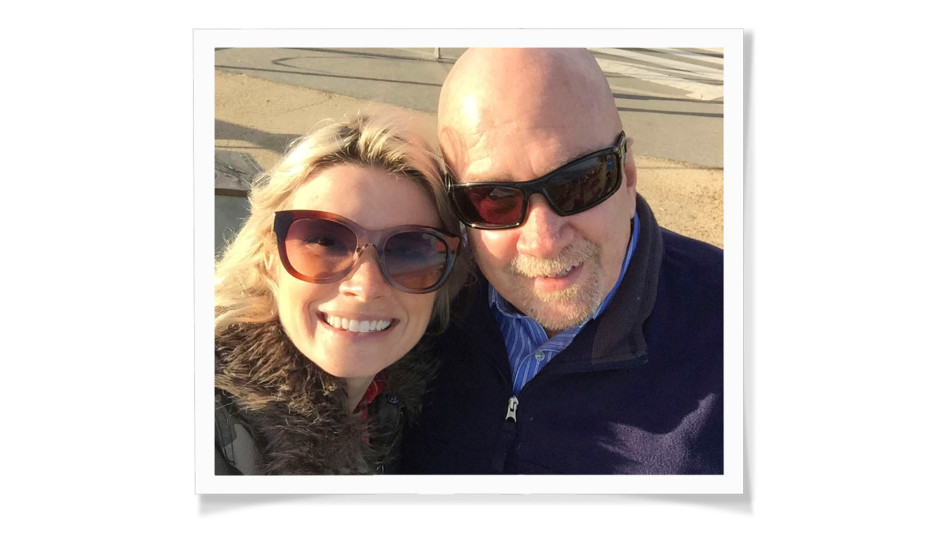A Writer's Story About Reconnecting With Her Estranged Father
It took years for Elizabeth Greenwood's father to fade from her life. It took a few dozen postcards to finally bring him back.

Photo: Courtesy of Elizabeth Greenwood
Three years ago, my father began sending me a postcard every day. "Twentieth-century texting," he called it. They were the kind of cards sold on revolving trees in gift shops, all from California, where he'd been living: Pismo Beach, Hearst Castle, Morro Bay. At first I flipped them over just to glance at his slanted cursive, distantly familiar from childhood. I remembered the flit of his pen over legal pads as he wrote his sermons with the aid of a Pepsi and a Winston Light. I hadn't seen him in years. I had, in many ways, given up on him. The cards piled up on the kitchen table, unread.
My dad is an Episcopalian minister. He divorced my mom in 1992, when I was 9 and my sister was 2, and rented an apartment in our Massachusetts town so we girls could spend every other weekend with him. Then a man— a "roommate"—named John moved in. When I questioned this, my father sat across from me in a diner and asked if I knew what a homosexual was, his hazel eyes tearing up behind his glasses. The extent of my knowledge came from school-yard taunts and TV; all I knew was it meant something bad, and that I didn't want my classmates to see him and John picking me up from school.
A few years later, my dad took a job in Cleveland, where his aging mother was battling cancer. Now my mom, a history professor, was raising my sister and me on her own, with the occasional child-support check. I'd see Dad over Christmas and in summer. His absence was a relief. I didn't have to worry about getting found out at school anymore. I was proud of the grit in my house of women, a tight braid of three. But I also felt his departure, like a door left ajar that we couldn't manage to close.
As the years passed, our connection frayed. Talking on the phone every few weeks became a tedious game of catch-up. Our chats touched on the big points, but we knew little of each other's daily lives. I didn't feel compelled to remind him where I was applying to college, or what I was studying, or where in New York I was living after that. The distance grew.
Then, when I was 30, I began receiving his daily dispatches. I was renting a room in a Brooklyn brownstone after being dumped by the man I'd thought I would marry. I was raw and afraid, staring myself down in the mirror, trying to catch a glimpse of the person I wanted to be.
Once the stack of unread postcards began to take up actual kitchen real estate (there were nearly two dozen), I went to toss them. Something stopped me. Hope, curiosity—whatever it was, I took a breath and started reading. The cards chronicled his daily life—battling the office copy machine, checking the chapel for leaks after rain. He was reading Steinbeck, which he found a relief after Tolstoy. He was decorating the Christmas tree with shells from the beach.
 Photo: Courtesy of Elizabeth Greenwood
Photo: Courtesy of Elizabeth Greenwood
I enjoyed his turns of phrase: Met with the Men's Group—what a goat rodeo! Or, The Begonia Festival in Capitola has begun. I never thought begonias worthy of a fest. Hesitantly, I answered. I'm finished grading papers. I'm waiting on the cable guy. I'm playing hooky to see a matinee. This was the closest I'd ever felt to him. Knowing another's daily rhythms is where true intimacy resides.
After two years of correspondence, I visited him in California. Through our exchanges, I'd come to see him with new compassion: the shame of growing up gay in a 1960s military household, the ache of missing your kids. Nothing had been easy for him.
One drizzly afternoon, he, John, and I hit the Mystery Spot, a tourist trap in a redwood grove where rooms seem to slant at impossible angles. We took pictures of ourselves grinning, and in the gift shop my dad bought more postcards.
Later that evening, I asked him to sit with me. I told him I was sorry for my absence over the years. I thanked him for all the postcards, now in the hundreds—bricks that built a foundation. We cried and embraced. He'd written himself back into my life.
Elizabeth Greenwood is the author of Playing Dead: A Journey Through the World of Death Fraud.
My dad is an Episcopalian minister. He divorced my mom in 1992, when I was 9 and my sister was 2, and rented an apartment in our Massachusetts town so we girls could spend every other weekend with him. Then a man— a "roommate"—named John moved in. When I questioned this, my father sat across from me in a diner and asked if I knew what a homosexual was, his hazel eyes tearing up behind his glasses. The extent of my knowledge came from school-yard taunts and TV; all I knew was it meant something bad, and that I didn't want my classmates to see him and John picking me up from school.
A few years later, my dad took a job in Cleveland, where his aging mother was battling cancer. Now my mom, a history professor, was raising my sister and me on her own, with the occasional child-support check. I'd see Dad over Christmas and in summer. His absence was a relief. I didn't have to worry about getting found out at school anymore. I was proud of the grit in my house of women, a tight braid of three. But I also felt his departure, like a door left ajar that we couldn't manage to close.
As the years passed, our connection frayed. Talking on the phone every few weeks became a tedious game of catch-up. Our chats touched on the big points, but we knew little of each other's daily lives. I didn't feel compelled to remind him where I was applying to college, or what I was studying, or where in New York I was living after that. The distance grew.
Then, when I was 30, I began receiving his daily dispatches. I was renting a room in a Brooklyn brownstone after being dumped by the man I'd thought I would marry. I was raw and afraid, staring myself down in the mirror, trying to catch a glimpse of the person I wanted to be.
Once the stack of unread postcards began to take up actual kitchen real estate (there were nearly two dozen), I went to toss them. Something stopped me. Hope, curiosity—whatever it was, I took a breath and started reading. The cards chronicled his daily life—battling the office copy machine, checking the chapel for leaks after rain. He was reading Steinbeck, which he found a relief after Tolstoy. He was decorating the Christmas tree with shells from the beach.
 Photo: Courtesy of Elizabeth Greenwood
Photo: Courtesy of Elizabeth Greenwood
I enjoyed his turns of phrase: Met with the Men's Group—what a goat rodeo! Or, The Begonia Festival in Capitola has begun. I never thought begonias worthy of a fest. Hesitantly, I answered. I'm finished grading papers. I'm waiting on the cable guy. I'm playing hooky to see a matinee. This was the closest I'd ever felt to him. Knowing another's daily rhythms is where true intimacy resides.
After two years of correspondence, I visited him in California. Through our exchanges, I'd come to see him with new compassion: the shame of growing up gay in a 1960s military household, the ache of missing your kids. Nothing had been easy for him.
One drizzly afternoon, he, John, and I hit the Mystery Spot, a tourist trap in a redwood grove where rooms seem to slant at impossible angles. We took pictures of ourselves grinning, and in the gift shop my dad bought more postcards.
Later that evening, I asked him to sit with me. I told him I was sorry for my absence over the years. I thanked him for all the postcards, now in the hundreds—bricks that built a foundation. We cried and embraced. He'd written himself back into my life.
Elizabeth Greenwood is the author of Playing Dead: A Journey Through the World of Death Fraud.



